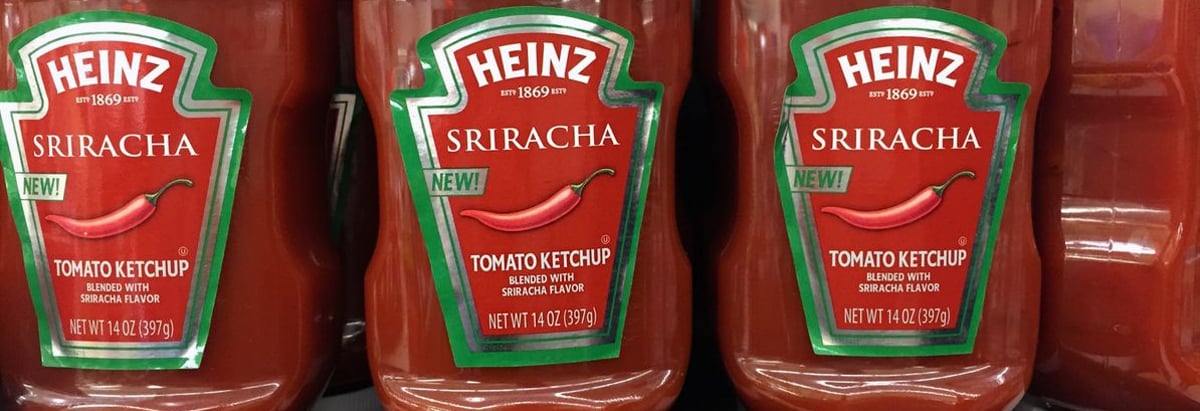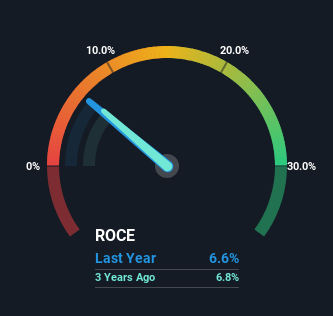
There are a few key trends to look for if we want to identify the next multi-bagger. Amongst other things, we'll want to see two things; firstly, a growing return on capital employed (ROCE) and secondly, an expansion in the company's amount of capital employed. Ultimately, this demonstrates that it's a business that is reinvesting profits at increasing rates of return. However, after investigating Kraft Heinz (NASDAQ:KHC), we don't think it's current trends fit the mold of a multi-bagger.
What Is Return On Capital Employed (ROCE)?
If you haven't worked with ROCE before, it measures the 'return' (pre-tax profit) a company generates from capital employed in its business. To calculate this metric for Kraft Heinz, this is the formula:
Return on Capital Employed = Earnings Before Interest and Tax (EBIT) ÷ (Total Assets - Current Liabilities)
0.066 = US$5.5b ÷ (US$90b - US$7.6b) (Based on the trailing twelve months to March 2024).
Thus, Kraft Heinz has an ROCE of 6.6%. Ultimately, that's a low return and it under-performs the Food industry average of 11%.
See our latest analysis for Kraft Heinz

Above you can see how the current ROCE for Kraft Heinz compares to its prior returns on capital, but there's only so much you can tell from the past. If you'd like, you can check out the forecasts from the analysts covering Kraft Heinz for free.
What Does the ROCE Trend For Kraft Heinz Tell Us?
There hasn't been much to report for Kraft Heinz's returns and its level of capital employed because both metrics have been steady for the past five years. This tells us the company isn't reinvesting in itself, so it's plausible that it's past the growth phase. So don't be surprised if Kraft Heinz doesn't end up being a multi-bagger in a few years time. With fewer investment opportunities, it makes sense that Kraft Heinz has been paying out a decent 49% of its earnings to shareholders. Unless businesses have highly compelling growth opportunities, they'll typically return some money to shareholders.
The Bottom Line
In a nutshell, Kraft Heinz has been trudging along with the same returns from the same amount of capital over the last five years. And with the stock having returned a mere 35% in the last five years to shareholders, you could argue that they're aware of these lackluster trends. Therefore, if you're looking for a multi-bagger, we'd propose looking at other options.
Like most companies, Kraft Heinz does come with some risks, and we've found 2 warning signs that you should be aware of.
While Kraft Heinz may not currently earn the highest returns, we've compiled a list of companies that currently earn more than 25% return on equity. Check out this free list here.
Valuation is complex, but we're here to simplify it.
Discover if Kraft Heinz might be undervalued or overvalued with our detailed analysis, featuring fair value estimates, potential risks, dividends, insider trades, and its financial condition.
Access Free AnalysisHave feedback on this article? Concerned about the content? Get in touch with us directly. Alternatively, email editorial-team (at) simplywallst.com.
This article by Simply Wall St is general in nature. We provide commentary based on historical data and analyst forecasts only using an unbiased methodology and our articles are not intended to be financial advice. It does not constitute a recommendation to buy or sell any stock, and does not take account of your objectives, or your financial situation. We aim to bring you long-term focused analysis driven by fundamental data. Note that our analysis may not factor in the latest price-sensitive company announcements or qualitative material. Simply Wall St has no position in any stocks mentioned.
Have feedback on this article? Concerned about the content? Get in touch with us directly. Alternatively, email editorial-team@simplywallst.com
About NasdaqGS:KHC
Kraft Heinz
Manufactures and markets food and beverage products in North America and internationally.
Undervalued with adequate balance sheet and pays a dividend.
Similar Companies
Market Insights
Community Narratives


